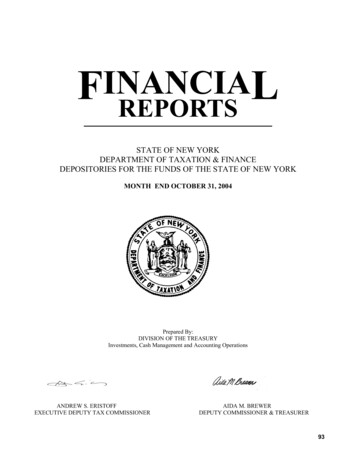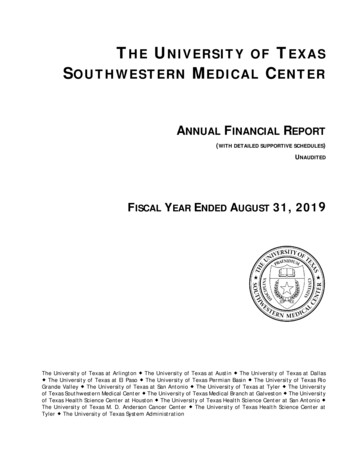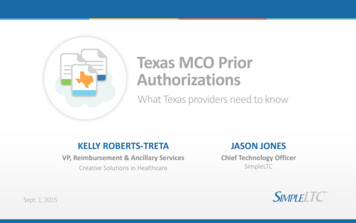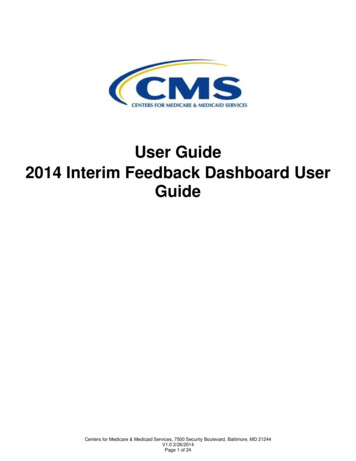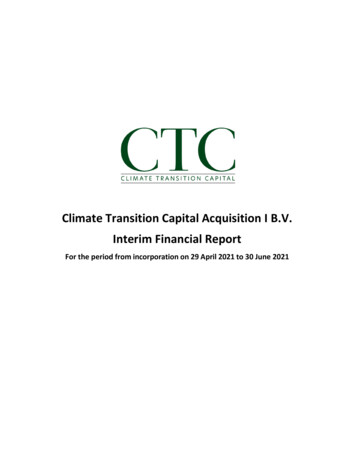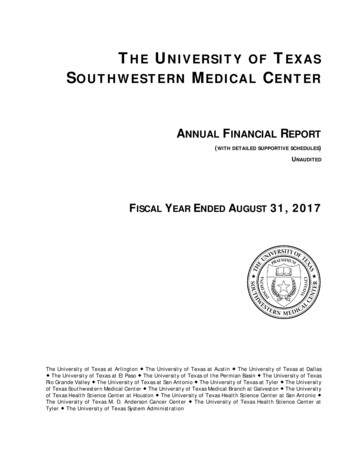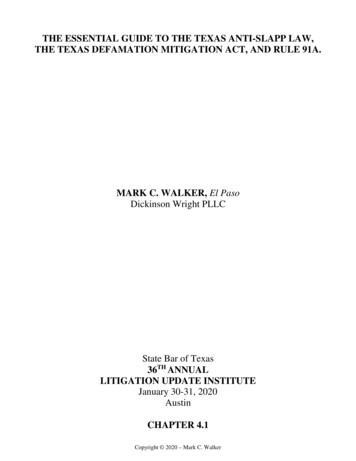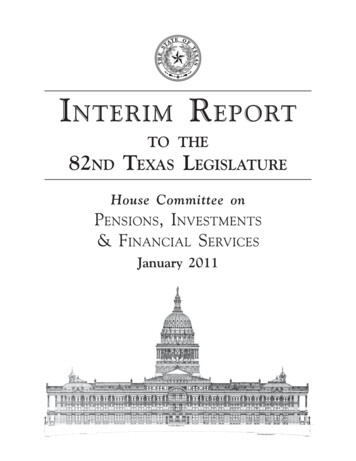
Transcription
I nterim R eportto the82nd Texas LegislatureHouse Committee onPensions, Investments& Financial ServicesJanuary 2011
HOUSE COMMITTEE ON PENSIONS, INVESTMENTS AND FINANCIAL SERVICESTEXAS HOUSE OF REPRESENTATIVESINTERIM REPORT 2010A REPORT TO THEHOUSE OF REPRESENTATIVES82ND TEXAS LEGISLATUREVICKI TRUITTCHAIRMANCOMMITTEE CLERKMERITA ZOGA
Committee OnPensions, Investments, and Financial ServicesJanuary 10, 2011Vicki TruittChairmanP.O. Box 2910Austin, Texas 78768-2910The Honorable Joe StrausSpeaker, Texas House of RepresentativesMembers of the Texas House of RepresentativesTexas State Capitol, Rm. 2W.13Austin, Texas 78701Dear Mr. Speaker and Fellow Members:The House Committee on Pensions, Investments and Financial Services of the Eighty-First Legislaturehereby submits its interim report including recommendations and drafted legislation for consideration bythe Eighty-Second Legislature.Respectfully submitted,Vicki Truitt (Chair)Rafael Anchia (Vice Chair)Charles "Doc" AndersonDan FlynnAna Hernandez LunaChuck HopsonTan ParkerMarc VeaseyBeverly Woolley
TABLE OF CONTENTSINTRODUCTION. 1CHARGE #1: STUDY THE IMPACT OF THE DEBT RELIEF INDUSTRY,INCLUDING DEBT MANAGEMENT AND DEBT SETTLEMENT ORGANIZATIONS,AND THE IMPLICATIONS OF REGULATING THAT INDUSTRY. . 2BACKGROUND . 3FINDINGS . 4RECOMMENDATIONS . 9CHARGE #2: EXAMINE TEXAS SCHOOL DISTRICTS' ADMINISTRATION OFTHEIR EMPLOYEES' OPTIONAL RETIREMENT INVESTMENTS. 10BACKGROUND . 11FINDINGS . 12RECOMMENDATIONS . 13CHARGE #3: REVIEW AND STUDY THE OVERALL HISTORY, GOALS, ANDPERFORMANCES OF THE STATE'S ECONOMIC DEVELOPMENT PROGRAM,CERTIFIED CAPITAL COMPANY. IDENTIFY AND RECOMMEND CHANGESAS NECESSARY. . 14BACKGROUND . 15FINDINGS . 17RECOMMENDATIONS . 18CHARGE #4: EXAMINE THE PERFORMANCE AND ACCOUNTABILITY OF THETEXAS PUBLIC PENSION FUNDS AND MAKE RECOMMENDATIONS ASNEEDED. . 19BACKGROUND . 20FINDINGS . 20RECOMMENDATIONS . 22CHARGE #5: MONITOR THE AGENCIES AND PROGRAMS UNDER THECOMMITTEE'S JURISDICTION. . 24BACKGROUND . 25FINDINGS . 25MINORITY REPORT. 32
INTRODUCTIONAt the beginning of the 81st Legislature, the Honorable Joe Straus, Speaker of the Texas Houseof Representatives, appointed nine members to the House Committee on Pensions, Investments,and Financial Services. The committee membership included the following: Vicki Truitt, Chair;Rafael Anchia, Vice Chair; Charles "Doc" Anderson; Dan Flynn; Ana E. Hernandez; ChuckHopson; Tan Parker; Marc Veasey; and Beverly Woolley.During the interim the committee was assigned five charges by the Speaker:1. Study the impact of the debt relief industry, including debt management and debtsettlement organizations, and the implications of regulating that industry.2. Examine Texas school districts' administration of their employees' optionalretirement investments.3. Review and study the overall history, goals, and performances of the state'seconomic development program, Certified Capital Company. Identify andrecommend changes as necessary.4. Examine the performance and accountability of the Texas public pension fundsand make recommendations as needed.5. Monitor the agencies and programs under the committee's jurisdiction.1
CHARGE #1: STUDY THE IMPACT OF THE DEBT RELIEF INDUSTRY,INCLUDING DEBT MANAGEMENT AND DEBT SETTLEMENT ORGANIZATIONS,AND THE IMPLICATIONS OF REGULATING THAT INDUSTRY.2
In response to this charge, the Committee held a public hearing on July 8, 2010. The Committeeheard both invited and public testimony.BACKGROUNDThe debt relief industry originated in the early twentieth century through debt pooling, thecontrolling and distributing of client funds to their creditors in a manner that did not require thediscretion and action of the client. This first generation of debt relief providers communicatedwith a consumer's creditor to negotiate a partial payment to satisfy the consumer's debt. If anagreement was reached, the debt relief providers would profit in heavy fees and creditors wouldreceive a smaller payment than expected. In the 1950s, more than half of state legislaturesoutlawed this industry.1 Texas prohibited debt pooling in 1965, but amended the statute in 1967to allow debt pooling by nonprofit organizations.Fast-forward to the 21st century, the Texas Senate Committee on Business & Commerceconducted an interim study on the credit counseling and debt management industry in 2004.Prior to the 79th Legislative Session, statutes pertaining to debt relief remained untouched since1967, but the business of debt relief was becoming one of the nation's fastest growing andunregulated industries. The Committee recommended that the Legislature modernize laws toenhance the regulatory structure and promulgate uniform standards of consumer protection inorder to protect consumers from misleading, deceptive, and harmful practices. In 2005, the 79thTexas Legislature enacted SB 1112 to regulate part of the industry requiring credit counselorsand debt management organizations to register with the Office of the Consumer CreditCommissioner and to maintain certain standards to renew registrations on an annual basis.However, the debt relief industry continued to evolve as citizens incurred increasing amounts ofdebt. Nationwide in 2010, the outstanding consumer credit reached 2.4 trillion.2The debt relief industry has three different business models designed to assist consumers withdebt. The first form of debt relief -- credit counseling -- offers services primarily by nonprofit1 National Conference of Commissioners on Uniform State Laws. Uniform Debt Management Services Act,Prefatory Note. 2005.2 Pettijohn, Leslie. Statement to the House Committee on Pensions, Investments, and Financial Services. Hearing,July 8, 2010. Available sts.php?session 81&committeeCode 3953
agencies (although some for-profit credit counseling entities operate in Texas) that aidconsumers in repaying their debt through budgeting and financial advice. The second form ofdebt relief service is the debt management service provider (DMSP) which is an organization,nonprofit or for-profit, that establishes a plan for a consumer to pay one consolidated periodicpayment to cover all debts in the program. The DMSP receives consolidated monthly paymentsfrom the consumer, holds the money in trust, and distributes monthly payments to the consumer'screditors. The DMSP often obtains reductions in finance charges from the creditors, but theconsumer pays the full principal balance owed. The DMSP usually receives a monthly fee fromthe consumer and may receive a payment (known as "fair-share") from the creditors. The thirdmodel is a debt settlement company (DSC). DSCs are for-profit entities that offer theircustomers a plan to resolve unsecured debt for less than the amount owed. DSCs attempt toreach an agreement with the consumers’ creditors for a lump sum payment in settlement of theconsumers’ debts. The plan requires that the consumer stop paying their creditors while the DSCnegotiates with creditors to discharge consumer's debt for a percentage of the amount owed.This model of the industry is currently not regulated under Texas law.Many credit counseling, debt management, and debt settlement companies offer legitimateservices to consumers. Due to misleading practices by some debt settlement companies, SB2233 was filed during the 81st Texas Legislative Session to require debt settlement services toregister and to provide information to the Office of Consumer Credit Commissioner regardingconsumer disclosures. SB 2233 was not enacted, and this Committee was tasked with studyingthe impact of the debt relief industry.FINDINGSAs a result of state legislation passed in 2005 (SB 1112) debt management service providers areregulated under Texas Finance Code, Chapter 394. There are 58 DMSPs registered in Texas, 53non-profit companies and five for-profit. Under statute, DMSPs are required to register with theOffice of Consumer Credit Commissioner and work under rules adopted by the FinanceCommission. The Finance Commission sets fee limitations, disclosure requirements, as well asconsumer counseling and education requirements. The Office of Consumer CreditCommissioner is enabled with enforcement authority over DMSPs, including cease and desist4
orders, administrative penalties, restitution, suspension, or license revocation. SB 1112 alsoestablished that a provider must use a trust account for the management of all money paid by oron behalf of a consumer for disbursement to the consumer's creditor. This requirement alloweddebt settlement companies to remain unregulated in Texas, as DSCs do not control consumerfunds.The Texas Attorney General’s office has received over 450 complaints from debt relief clients,mainly debt settlement clients, over the last two years.3 Allegations were categorized into threemain concerns: high upfront fees, misrepresentation of services offered, and risks or implicationsnot disclosed to the consumer. The debt settlement program requires a cessation of paymentsthat technically put consumers in default of their contractual obligations with creditors, thustriggering aggressive debt collection efforts and even lawsuits by some creditors. As of July2010, the Office of Attorney General filed six lawsuits under the Deceptive Trade Practices Act,with more investigations pending that could not be discussed at the time of the interim hearing.In these instances, debt settlement companies have been charged with the failure to negotiatesettlements with creditors, charging customers for services that were not delivered, andmisstating the effects of entering into a debt settlement program. Additionally, concerns havebeen raised that certain disreputable firms in the industry are not disclosing the increased risk oflawsuits, decreased consumers credit scores, debt forgiveness-related tax liabilities, increasedcollection efforts, interest, and late payment fees.Nationwide, during the 2009 legislative session, 25 states introduced legislation regarding creditcounseling, debt management and/or debt settlement. In the 2010 legislative period, 23 statesintroduced legislation and Illinois, Indiana, Kansas, Kentucky, Maryland, Minnesota, Mississippiand Virginia have enacted legislation this year.4 Most legislation requires debt settlementcompanies to: a) register as a consumer debt management service provider in that state andprovide detailed information concerning the services they offer; b) provide disclosures regarding3 Dyer, Jay. Statement to the House Committee on Pensions, Investments, and Financial Services. Hearing, July 8,2010. Available at: .php?session 81&committeeCode 3954 Morton, Heather. "Credit Counseling, Debt Management and Debt Settlement 2009 Legislation". NationalConference of State Legislatures. September 8, 2010. ndSettlement/tabid/18564/Default.aspx?tabid 18564 5
fees; and c) explain the risks and benefits of contracting with a debt relief service provider.Some states have regulated the industry further with fee caps, security bonds, and strictaccounting requirements. A number of studies confirmed the need for regulation including theUnited States Government Accountability Office (GAO). The GAO conducted an investigationin 2010 and found that 17 out of 20 debt settlement companies investigated engaged infraudulent, abusive, and deceptive practices to consumers.5Forty states and one U.S. territory signed onto the National Association of Attorneys Generalletter to the Federal Trade Commission (FTC) regarding Proposed Rulemaking to amend theFTC’s Telemarketing Sales Rule, 16 C.F.R. Part 310 to address the sale of debt relief services.At least 21 states brought forth 128 enforcement actions against debt relief companies.Nationwide, charges brought against unscrupulous DSCs included: unsubstantiated claims of consumer savings; deceptive representations about the length of time necessary to complete a debt reliefprogram; failing to adequately inform consumers they will be subject to continued collectionefforts, including lawsuits and increases to account balances due to extendednonpayment; deceptive disparagement of consumer credit counseling; deceptive disparagement of bankruptcy as an alternative for debtors; collection of substantial upfront fees so that a debt relief company gains even if it fails toperform; lack of transparency and information for consumers as to payment of fees, status ofaccounts, and communications with creditors; significant delays in active negotiation or engagement with creditors; savings claims and settlement fees based, not on the original balance, but on the inflatedamount due, including late fees and default rates of interest at the time of settlement.65 U.S. Government Accountability Office. Debt Settlement. Fraudulent, Abusive, and Deceptive Practices PoseRisk to Consumers. (GAO-10-593T). April 2010. Available at: http://www.gao.gov/new.items/d10593t.pdf6 National Association of Attorneys General. Letter to Federal Trade Commission. Re: Telemarketing Sales Rule -6
Subsequent to the interim hearing held on July 8, 2010, the FTC issued their Final Rule towhich debt relief services (including debt settlement companies) are subjected. These ruleswent into effect on October 27, 2010. It defines "debt relief service" to include "any service orprogram represented, directly or by implication, to renegotiate, settle, or in any way alter theterms of payment or other terms of the debt between a person and one or more unsecuredcreditors or debt collectors, including but not limited to, a reduction in the balance, interest rate,or fees owned by a person to an unsecured creditor or debt collector."7 Specifically, the Ruleprovides:1. Scope: The Final Rule applies to for-profit companies that sell debt relief services overthe telephone, including credit counseling, debt settlement, and debt negotiation servicesthat aim to reduce credit card or other unsecured debt. The Rule applies to inbound andoutbound telemarketing calls.2. Advance fee ban: Debt relief companies may no longer charge a fee before they settle orreduce a customer's debt. To collect a fee, the company must first have reached asuccessful result for the consumer, must have an agreement between the customer andcreditor, and the customer must have made one payment to the creditor. If the customerahs multiple debts, the company can collect a pro-rate share of its total fee once itcompletes each of these steps for each debt.3. Disclosures: Debt relief companies will be required to make four specific disclosures toconsumers, including:a. how long it will take for consumers to see results,b. how much it will cost,c. the negative consequences that could result from using debt relief services, andd. key information about dedicated accounts if they choose to require them.4. Misrepresentations: Debt relief companies will be prohibited from makingmisrepresentations, including specific misrepresentations commonly made in this area.5. Dedicated Bank Account for Fees and Savings: As part of the advance fee ban, theRule specifies that debt relief companies may require that consumers set aside their feesDebt Relief Amendments Matter No. R41100123. Oct. 2009. Available 091023.FTC Debt Relief Final.pdf7 16 C.F.R. § 310.2(m) (definition of “debt relief service”)7
and savings for payment to creditors in a "dedicated account" if the following fiveconditions are met:a. the dedicated account is maintained at an insured financial institution,b. the consumer owns the funds (including any interest accrued),c. the consumer can withdraw the funds at any time without penalty,d. the provider does not own or control or have any affiliation with the companyadministering the account, ande. the provider does not exchange any referral fees with the company administeringthe account.6. Enforcement: State Attorneys General have authority to enforce the Rule upon notice tothe FTC. This is in addition to States' general deceptive trade practice laws.8As a result, the Final Rule applies to for-profit debt relief services, including credit counseling,debt settlement, and debt negotiation services. The Final Rule does not cover nonprofit firms,unless companies falsely claim nonprofit status. All debt relief companies are subject to the newFTC rules and State Attorneys General have authority to enforce the Rule in addition to States'general deceptive trade practice laws.The U.S. Congress also took action with the passage of H.R. 4173, the "Dodd-Frank Wall StreetReform and Consumer Protection Act of 2010". The Act creates a new, independent bureauwithin the Federal Reserve System, the Bureau of Consumer Financial Protection (CFPB). TheCFPB is vested with rulemaking, supervisory and enforcement authority over a wide range ofconsumer financial products and services, including financial advisory services such as creditcounseling, debt management, and debt settlement. Effective July 21, 2011, the ConsumerFinancial Protection Bureau will take over enforcement of federal consumer protection laws andhave full authority to prescribe rules or issue orders pursuant to any federal consumer financiallaw. To the extent that a state law affords greater protections to consumers, such state law willnot be deemed inconsistent and is therefore not preempted.8 "Debt Relief and Debt Settlement- An Executive Summary". Texas Office of the Attorney General. December2010.8
RECOMMENDATIONS Debt relief plans are options for consumers who cannot otherwise afford or manageunsecured debt but cannot or do not wish to file for bankruptcy. The Texas Legislaturemust determine a balance between consumer protection and industry regulation in orderto create an environment where legitimate debt relief companies could compete toprovide services desired by consumers. The Committee recommends that Texas establisha method by which debt settlement companies may register with the Office of ConsumerCredit Commissioner and allow free market forces to facilitate the better companies'serving the public need.9
CHARGE #2: EXAMINE TEXAS SCHOOL DISTRICTS' ADMINISTRATION OFTHEIR EMPLOYEES' OPTIONAL RETIREMENT INVESTMENTS.10
In response to this charge, the Committee held a public hearing on June 22, 2010. TheCommittee heard both invited and public testimony.BACKGROUNDThe 77th Legislature passed SB 273 in 2001 to set guidelines for certification by companies whooffer voluntary 403(b) investment options through salary reduction agreements between publicschool employees and their local employer. It required the Teacher Retirement System tocompile a list of companies from which school employees can choose when they wish to use asalary reduction agreement to make their investments. SB 273 set out rules on how 403(b)products could be marketed to end anti-competitive marketing practices of some of these 403(b)vendors.In November 2004, the United States Department of the Treasury and the Internal RevenueService proposed regulations that would increase the responsibility of public school districts andother employers for retirement plans offered under the Internal Revenue Code. During the 80thLegislative session, House Bill 2341 was passed into law to enable school districts to complywith changes in the Internal Revenue Code without violating Texas Statutes. However, someindustry participants expressed fears that some 403(b) vendors would take advantage of thechange in federal regulations and deploy anti-competitive marketing practices again in Texasschool districts. With this change in IRS regulations, the practice of using free or reduced-pricedthird party administration services (TPAs) to limit competition for 403(b) products amongteachers began to take place in some parts of the state.Some school districts were giving preferential treatment to various 403(b) vendors in exchangefor benefits from TPA's, the TPA's 403(b) affiliates, or their agents. In these instances a companywould approach a school district with significant concerns about the district's compliance withthe new 403(b) rules. The company would offer to administer 403(b) TPA reporting orcompliance for “free or at a reduced price.” The district need only to agree to let the companyhandle compliance for all of the various 403(b) vendors, and in many cases, make them the sole457(b) provider. Through this relationship, some TPAs de-listed many of their competitors offthe payroll and attempted to push their own 403(b) product, at the expense of existing ones,11
despite clear prohibitions in the law that a school may not accept any benefit from a companyoffering a qualified investment product, such as a 403(b) plan. This deceptive practice hurtteachers who may have paid fees and bought retirement plans unnecessarily, as well as otherthird-party agents who could not compete with large agencies offering their services as “lossleaders.”Business models that allow companies that are contracted with school districts to be their thirdparty administrator as well as a vendor, or affiliated vendor, result in an inherent conflict ofinterest. This does not provide sufficient protections to ensure that the information given to orthe products offered to school teachers are objective and in their best interest. As a result HB3480 was passed during the 81st Legislative session to stop the emerging practice of using freeor reduced-priced third party administration services as vehicles to limit competition for 403(b)products.FINDINGSHB 3480 (81R) provided safeguards to protect teachers' investments by requiring firms toregister with, be licensed by, or regulated by the Texas Department of Insurance (TDI), the StateSecurities Board (SSB), and the Texas Department of Banking (TDB), respectively, and torequire that their products are approved by the Teacher Retirement System of Texas (TRS). Thisensures that all service providers and their products are appropriately vetted before a companyenters into a contract with a school district. The bill also allows TDI, SSB, and TDB toinvestigate any complaint received from TRS regarding this issue.TRS has no direct authority over 403(b) program, but HB 3480 required school districts thatenter into salary reduction agreements for 403(b) products to only contract with companies thatare certified by TRS. Under the program TRS, by rule, sets fee limits and maintains a websitewith registered products and fee details so all members can access over 9,000 different listings.Currently there are 86 certified companies and 266 products with 9,605 investment optionsregistered.12
TDI and the SSB now register TPAs, resolve complaints, and have enforcement capabilities theydidn't have prior to the legislation."From the perspective of the SSB, it appears that HB 3480 and changes that have beenmade in IRS regulations have addressed the two areas we had problems with previouslyin enforcement We haven't had any complaints since the past legislation orimplementation."9The State of Texas is on the forefront of protecting our teachers. Prior to SB 273 in 2001, therewere 5 class-action lawsuits brought by Texas teachers for abuses addressed in SB 273.Teachers settled for over 40 million. HB 3480 continues those protections and specifies that acompany can either sell a 403(b) product, or administer the 403(b) plan in a district, not bothwithin the same school district.RECOMMENDATIONS The Legislature, agencies, and school districts need to continue to monitor any futurechanges in IRS regulations and behavior of the market. No additional legislationindicated at this time.9 Morgan, John. Statement to the House Committee on Pensions, Investments, and Financial Services. Hearing,June 22, 2010. Available sts.php?session 81&committeeCode 39513
CHARGE #3: REVIEW AND STUDY THE OVERALL HISTORY, GOALS, ANDPERFORMANCES OF THE STATE'S ECONOMIC DEVELOPMENT PROGRAM,CERTIFIED CAPITAL COMPANY. IDENTIFY AND RECOMMEND CHANGESAS NECESSARY.14
In response to this charge, the Committee held a public hearing on June 22, 2010. TheCommittee heard both invited and public testimony.BACKGROUNDThe Certified Capital Company (CAPCO) is a government-sponsored, private venture capitalcompany formed to provide growth capital to small businesses in states to stimulate job growthand economic development in the state. Approximately 20% of states across the country haveimplemented CAPCO programs to encourage the growth of businesses in their jurisdictions.10The program in Texas was created in 2001 under SB 601 but not authorized until 2005 underProgram One. In 2007 the Legislature approved HB 1741 which authorized CAPCO ProgramTwo in order to allow an additional 200 million in investment credits. It also added lowincome community business as an investment option for CAPCOs in Program One and ProgramTwo.The goal of CAPCO programs is to strengthen local economies by stimulating flow of capital toearly-stage businesses that are unable to access traditional financing, in order to create jobopportunities and increase tax revenue. Early-stage businesses are defined under statute as thoseentities that meet at least one of three criteria: revenues must be under 2 million during theprevious fiscal year; the business must not be more than two years old; or the business must beinvolved in the development of a new product or service.The Comptroller's office and the Texas Treasury Safekeeping Trust Company are responsible foradministering the program. The CAPCO program is funded by "Insurance Premium TaxCredits" rather than state general revenue. Insurance companies subject to premium taxes investmoney into CAPCO's. These insurance companies receive a note and in turn, are repaid via thetax credits earned by the CAPCOs for the amount of that investment. The insurance companywill receive its principal back in the form of tax credits in a dollar for dollar reduction inpremium taxes the insurance company would have owed the state.10 "What Are CAPCO Programs?" Retrieved from: http://www.capcofacts.com/what-is-capco.html.15
In Texas, only insurers who are required to pay a premium tax on insurance policies issued inTexas are eligible to invest in CAPCO-issued debt instruments. Each CAPCO must have twoprincipals or employees with investment management experience in the venture capital industry.CAPCOs compete for available funds from a limited pool of insurance company investors.Unlike typical venture capital funds, the rules governing the types of businesses and thestructures of CAPCO investments are targeted and restrictive. The CAPCO legislation wasdesigned to support strategically located and early-stage businesses, businesses that have at least80 percent of their employees (either head count or payroll amount) located in Texas, andentrepreneurs who are developing new products or services and are in need of expansion capital.Under statute, the CAPCO must invest 30 percent of its certified capital within three years offunding and 50 percent by the end of the fifth year. It must invest 50 percent of its capital inoperations defined as early-stage businesses and 30 percent into businesses with principalbusiness operations in strategic investment areas (SIA). The State Comptroller makes an annualdetermination of what constitutes an SIA, based on unemployment and per-capita income andalso including locations identified as federal urban empowerment zones. The SIA designation isa state economic develo
However, the debt relief industry continued to evolve as citizens incurred increasing amounts of debt. Nationwide in 2010, the outstanding consumer credit reached 2.4 trillion.2 The debt relief industry has three different business models designed to assist consumers with debt.
